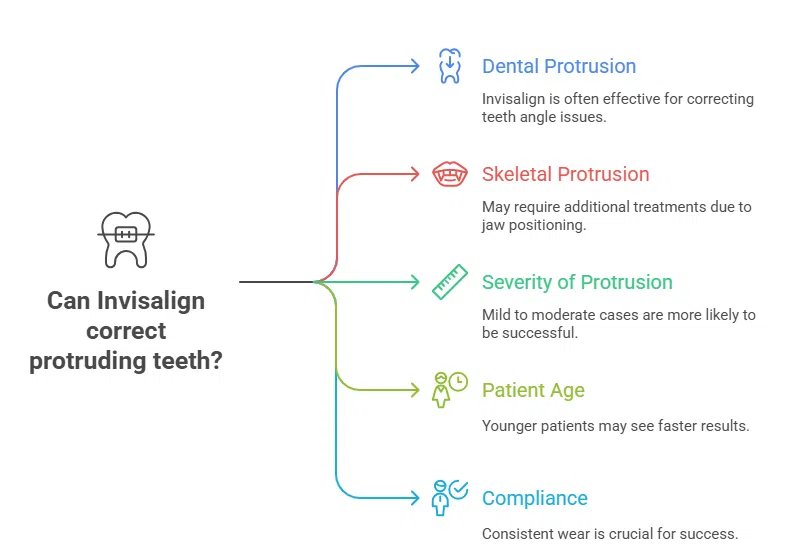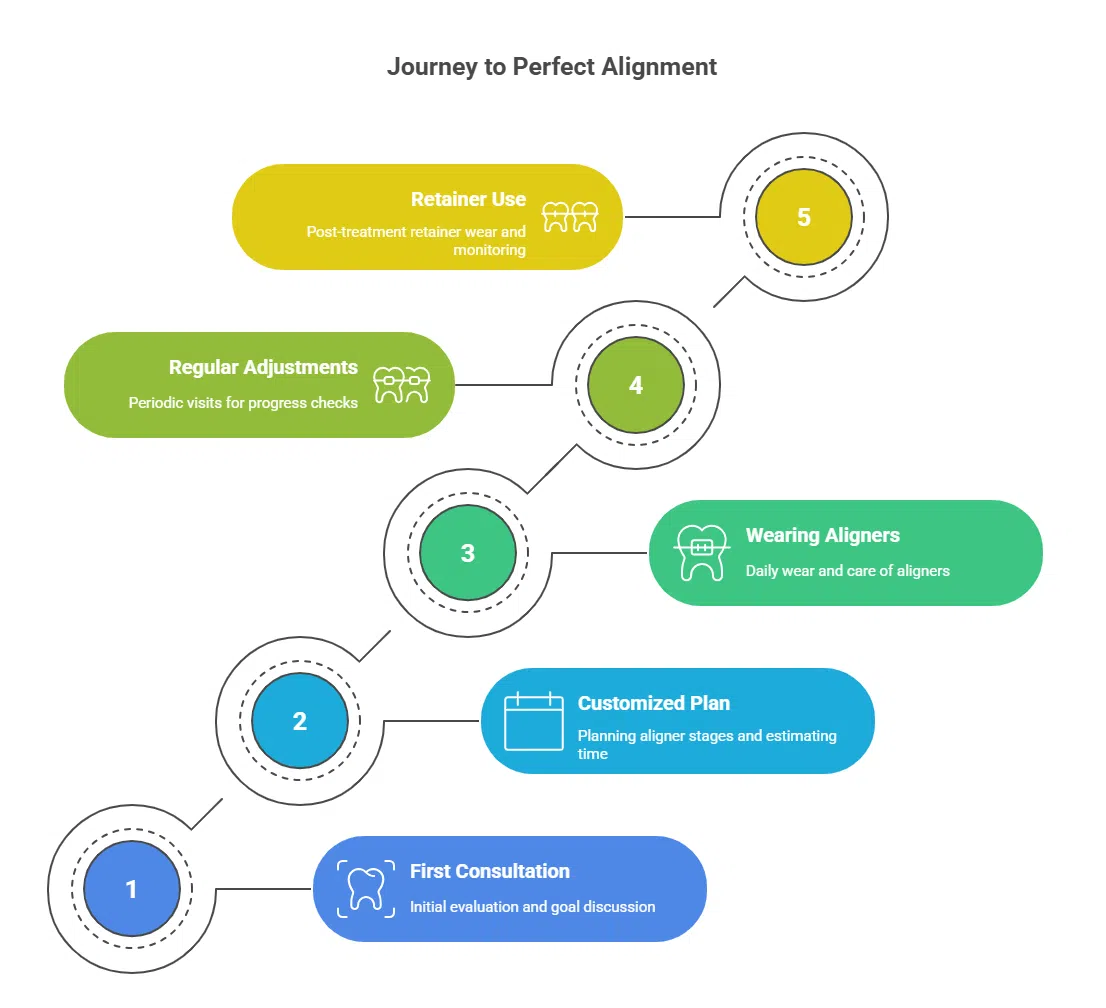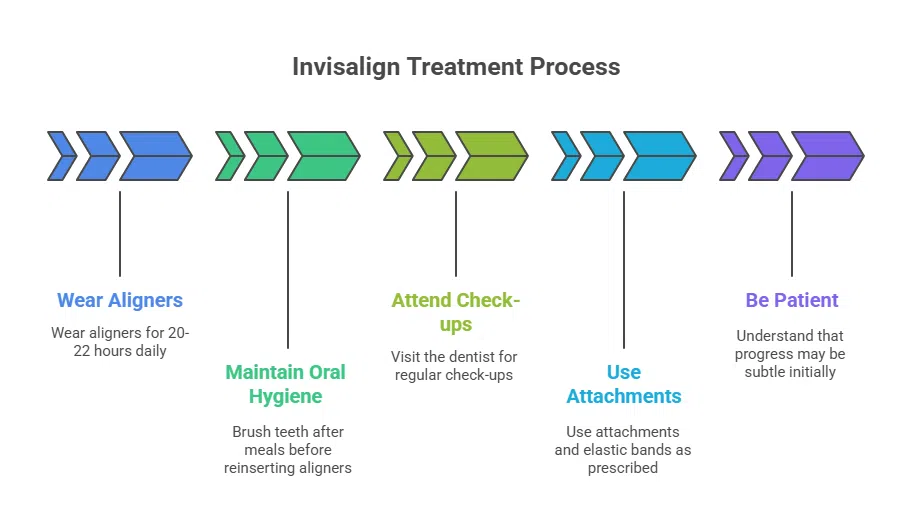Protruding teeth, often called “buck teeth,” overjet, or simply front teeth that stick out, can be both a cosmetic concern and a functional issue. Many people in Weymouth, MA, ask: Can Invisalign fix protruding teeth? At Comfort Dental Weymouth, we believe the answer is yes—in many cases—with the right evaluation, planning, and patient commitment. This guide will explain precisely how Invisalign can address protruding teeth, when it works best, what the process involves, what to expect in Weymouth, and how it compares to other treatments. We’ll also cover your questions, cost considerations, timelines, and frequently asked FAQs to help you make an informed decision.
What are Protruding Teeth?
- Definition: Protruding teeth refers to teeth, usually in the front (upper or sometimes lower), which “stick out” more than typical alignment. In orthodontics, this can be related to overjet (horizontal distance between upper and lower front teeth), or sometimes from dental crowding or jaw issues.
- Causes include genetics, childhood habits (thumb-sucking, pacifier use), tongue thrusting, uneven jaw growth, loss of teeth, or trauma.
- Problems associated: beyond cosmetic appearance, protruding teeth can increase risk of injury (if bumped), speech issues, bite difficulties, uneven wear, gum exposure leading to gum problems, and maybe self-confidence issues.
Can Invisalign Fix Protruding Teeth?
The short answer: Yes—In many mild to moderate cases.
But there’s nuance. Whether Invisalign can successfully fix protruding teeth depends on:
- Type of protrusion: Is it dental (teeth angle) vs skeletal (jaw positioning)?
- Severity: How far forward are the teeth? How deep or shallow is the bite?
- Age: Younger patients (teens) sometimes get faster results; adults often still viable, but movement is slower, and skeletal issues may need adjunct treatment.
- Compliance: Invisalign must be worn ~20-22 hours per day.
Research and Invisalign’s own resources show that buck teeth (upper front teeth protruding) are among the treatable cases.
For example, Invisalign’s site “Treating Buck Teeth with Invisalign Clear Aligners” asserts that many cases of buck teeth/overjet can be corrected using Invisalign.
How Invisalign Works for Protruding Teeth
- Initial Assessment & Diagnosis: At Comfort Dental Weymouth, we perform dental exams, impressions or digital scans, X-rays, photos. We evaluate whether protrusion is mainly dental, skeletal, or a mix.
- Treatment Plan Creation: Based on your dental records, the plan will map out how teeth need to move, in what sequence, and whether attachments (small tooth “buttons”) or elastics are needed to assist.
- Aligners Use: You wear a series of custom clear aligners, each set for approx. two weeks, switching to the next. Each aligner applies gentle pressure to shift teeth.
- Regular Monitoring: Periodic check-ups to measure progress, adjust plan if needed.
- Retention Phase: After treatment, retainers are used to keep teeth in place. Missing retention leads to relapse (teeth moving back).
When Invisalign May Not Be Enough
While Invisalign is powerful, there are cases where alone it may not fully correct protruding teeth. These include:
- Severe skeletal overjet / jaw discrepancy: If the maxilla (upper jaw) or mandible (lower jaw) is significantly misaligned, surgical orthodontics or jaw surgery might be required. Invisalign can handle tooth movement, but not bone repositioning.
- Very protrusive teeth with root issues or very thin bone support: If teeth are already angled too far, or bone is not strong enough, moving them further may risk root resorption or gum recession.
- Poor compliance: If aligners aren’t worn as prescribed, movements may stall or revert.
- Age-related constraints: In fully grown adults, bone remodeling is slower; if skeletal components are involved, treatments are more complex.
Invisalign vs Braces for Protruding Teeth
| Factor | Invisalign | Traditional Braces |
| Appearance / Discreetness | Nearly invisible, clear aligners | Metal/ceramic brackets/wires very visible |
| Comfort | Smooth, less irritation | Wires/brackets may irritate cheeks, need adjustments |
| Removability | Removable → easier oral hygiene, eating | Fixed → more dietary restrictions, harder cleaning |
| Control over severe tooth/jaw movement | Good for mild to moderate; less control for very complex or skeletal issues | Often better for teeth requiring large movements or skeletal work with appliances |
| Treatment Duration | Typically 6-18 months (for many cases) | Often similar or sometimes longer depending on complexity |
| Compliance needed | High (wear 20-22h/day) | Less patient-controlled; brackets are always working |
From Weymouth Dental Associates’ site: Invisalign in Weymouth, MA is offered and they note that Invisalign is “meant for patients with minor orthodontic or alignment problems such as crooked teeth.” They caution that “moderate to severe issues” may need alternative methods.
What to Expect at Comfort Dental Weymouth
If you choose Comfort Dental Weymouth, here’s how your path might look:
First Consultation
- Clinical evaluation: digital scans, photographs, X-rays.
- Discussion about goals: aesthetic desires, functional concerns (bite, speech).
- We check long-term oral health: bone, gums, roots.
Customized Invisalign Plan
- We plan stages: how many aligner sets, whether attachments/elastics needed.
- Time estimate given (often between 8-18 months, depending on severity).
Wearing & Caring for Aligners
- Wear aligners ~20-22 hours/day. Remove only for eating/drinking (except water), brushing/flossing.
- Clean aligners properly. Avoid staining, warping.
Regular Adjustments & Check-Ins
- Periodic visits to measure progress; new scans if needed.
- Minor refinements possible if teeth don’t move exactly as planned.
Retainer Use Post-Treatment
- Nighttime or full-time wear depending on case.
- Periodic check-ups to monitor that teeth remain in new position.
Time & Cost: What Patients in Weymouth Should Know
Timeline & Cost Estimates
- Time: Mild-moderate protruding teeth often resolve in 6-12 months; more severe overjet or mixed skeletal/dental cases may take 12-18+ months. Some sources say up to 18 months or more.
- Cost: Variable. In Weymouth, Massachusetts, cost depends on severity, number of aligners, whether attachments/elastics or combined treatments are needed, insurance, and whether you are paying out-of-pocket. Many providers offer payment plans. As a rough range, Invisalign tends to cost more than simple braces but less visible. For a local quote, scheduling a consultation at Comfort Dental Weymouth will give you precise numbers.
Practical Tips for Success
How to Maximize Your Chances with Invisalign
- Always wear your aligners as prescribed (20-22h/day). Skipping wear delays progress.
- Maintain excellent oral hygiene—brush after meals before putting aligners back in.
- Don’t skip check-ups. If teeth aren’t moving as expected, adjustments may be needed.
- Use attachments properly; elastic bands if prescribed.
- Be patient; movements often feel subtle at first.
Why Choosing a Local Provider Matters
- Comfort Dental Weymouth knows local demographic, insurance participation, and has experience with community patients.
- Proximity means more accessible check-ups, faster resolution of problems.
- Local providers familiar with Invisalign in Weymouth (e.g. Weymouth Dental Associates, Unident Group, Comfort Dental Weymouth) often have established reputations.
People Also Ask
- How long does Invisalign take to fix protruding front teeth?
It depends on severity, but many mild to moderate cases improve in 6-12 months. More complex protrusions (especially with skeletal involvement) can take 12-18 months or more. - Will Invisalign work better than braces for protruding teeth?
It depends. Invisalign is excellent for mild to moderate protruding teeth and offers benefits in aesthetics and comfort. Braces tend to give more force and control in severe cases or when jaw alignment is involved. - Do you need to pull teeth (extraction) before Invisalign for protruding teeth?
Sometimes. If there’s not enough space in your mouth to align all teeth properly without creating crowding, extraction may be recommended. But many cases don’t need extraction. - Can Invisalign fix overjet (upper front teeth sticking out)?
Yes. Overjet is one type of protrusion. Invisalign can address overjet in many cases, particularly mild to moderate, sometimes combined with elastics or attachments. - Does age affect Invisalign success for protruding teeth?
Yes. Younger patients tend to have faster, more responsive tooth movement. But adults can successfully undergo Invisalign; it may just take longer, and skeletal growth isn’t modifiable in adults. - Are there risks with moving protruding teeth with Invisalign?
Risks include root resorption (roots shortening), gum recession, relapse (teeth moving back), or elongated treatment if aligners aren’t used properly. Having a qualified provider minimizes risks. - How painful is Invisalign when correcting protruding teeth?
There may be mild discomfort or pressure when switching to a new set of aligners, but it is usually much less painful than adjustments with metal braces. - Can Invisalign fix lower protruding teeth?
Yes. While upper front teeth protruding is more common, lower teeth can also protrude. Invisalign can correct protruding lower front teeth depending on the case. - Will teeth shift back after Invisalign if I stop using the retainer?
Yes. Without proper retention after treatment, teeth tend to drift back toward their previous positions. Using a retainer as prescribed (often nightly) is crucial. - Does insurance cover Invisalign for protruding teeth in Weymouth, MA?
It depends on your plan. Some dental insurance plans cover part of Invisalign if determined “medically necessary.” Comfort Dental Weymouth may offer financing options. Best to check with your provider and our office.
Frequently Asked Questions (FAQs)
- What severity of protruding teeth can Invisalign correct?
Invisalign is most effective for mild to moderate protruding teeth, including overjet up to several millimeters. Severe skeletal protrusion may need orthodontic surgery. - How many hours a day must I wear Invisalign to fix protruding teeth?
Typically 20-22 hours per day. Less wear slows treatment or reduces effectiveness. - Will I need attachments or elastic bands with Invisalign for protruding teeth?
Possibly. Attachments (small tooth “buttons”) and elastics are often used to apply extra force or guide movement, especially for front teeth or overbite correction. - How often are check-ups required during Invisalign treatment?
Usually every 4-8 weeks to monitor progress, sometimes more frequently if refinements are needed. - Is Invisalign less painful than braces for correcting protruded front teeth?
Generally yes. Discomfort tends to be milder since there are no brackets or wires pressing on cheeks. Most discomfort occurs when switching aligner sets. - Do I need to have jaw surgery if my protruding teeth are due to skeletal issues?
In severe skeletal discrepancy (upper or lower jaw misaligned), yes, orthognathic surgery may be required. Invisalign by itself moves teeth, not restructuring bone. - Can Invisalign fix a protruding tooth without extraction?
Many times yes, particularly in mild cases. But extraction may be necessary when there is insufficient space for proper alignment. - What happens if I lose or break an aligner during treatment?
Contact your provider immediately. You may need to revert to previous aligner or move ahead, depending on how far you are in the current aligner. Delays may occur. - How much does Invisalign cost in Weymouth, MA to fix protruding teeth?
Costs vary by severity, treatment length, use of attachments/elastics, insurance coverage, and provider fees. Expect to get a personalized quote from Comfort Dental Weymouth. - Will my speech be affected during Invisalign treatment for protruding teeth?
There may be a temporary lisp or slight change in speech at first, especially if attachments are placed. Usually, speech adapts within days to a couple of weeks.
Conclusion
If you’re in Weymouth, MA, wondering “Can Invisalign fix protruding teeth?” the answer is very likely yes—especially if your case is mild to moderate, non-skeletal, and you follow treatment well. Comfort Dental Weymouth offers experienced local providers, modern digital scanning, custom treatment planning, and patient-focused care to maximize your chances of success. The journey involves assessment, wearing aligners, monitoring, and retention. For severe protrusion or jaw issues, additional treatments may apply. The most important step is to schedule a consultation to learn what your personal case will require. If you are looking for a Weymouth dentist near you, please visit Comfort Dental Weymouth, 47 Washington St, Weymouth, MA 02188, (781) 337-3300.



